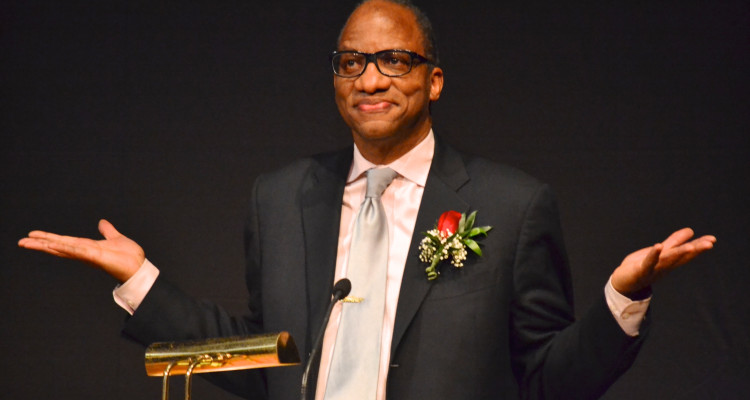Tebben Gill Lopez/The Mirror
Wil Haygood stepped onstage at the Regina A. Quick Center for the Arts and there was a brilliant shine from his tie clip.
The Washington Post award-winning reporter and writer of several books is most widely known today for his story that inspired Lee Daniels’ “The Butler.” When Haygood got the idea for the story, he looked for a butler he had heard about. He called 57 people in the D.C. area by the name of Eugene Allen. The 57th person to answer the phone was the man who served for eight U.S. presidents (from Eisenhower to Reagan) in the White House.
As the keynote of Fairfield’s 2014 MLK Convocation, Haygood was positioned to tell the story through the eyes of an African-American journalist looking to bring a buried story to light during President Obama’s 2008 campaign.
When Allen served former President John F. Kennedy, he was given a 14-karat gold-plated tie clip as a token of appreciation for his service – an intimate gesture from a white president to a black butler during a great period of racial tension in America.
“I am honored to report that I am wearing that tie clip right now,” Haygood told the Quick Center audience.
“I’ve always tried to go after the stories that others might overlook. Because I have enough confidence in myself that maybe I can bring some reporting dimension or I could bring some writer-ly dimension to that story. That’s what I know is inside me every time I walk out the house and I tell myself, ‘OK, I got to find a different story,” Haygood said.
Then President-elect Barack Obama was so moved by the story of the Butler written by Haygood, that Haygood and Allen were invited to the 2009 inauguration. Haygood said that he considers Allen’s life “epic.”
When asked if he believed if his own life as a cultural voice for America was epic, Haygood replied: “No, no …
“I do love the fact that maybe if I hadn’t have knocked on Mr. Allen’s door, he might have gone unknown … I’m very proud of the fact that the stories that I have seemed to uncover have found an audience. That doesn’t always happen. I’m very proud of that fact.”
In the film, Allen’s wife is depicted as passing away at their kitchen table one morning. In reality, Haygood happened to interview the elderly couple on their wedding anniversary. That night, family visited the house and Allen’s wife went to go to bed early. She announced to the guests, Haygood and her husband that she was going to bed, but that she felt very at peace with the fact that Allen’s story of witnessing history would finally be told. She passed away in her sleep that night.
Despite whatever adaptations were made to the story for film, Haygood told the Fairfield audience that it was the best movie he had ever seen.
“My thinking is if you find a good story, and the better unknown the story is, the further back in the woods the story is, the more impact it can have when it does hit the light. Which is why I think the Eugene Allen story had impact. He was so far in the basement, so far, so far in the back, that when his story was brought to the light, it even touched the president-elect of the United States. I think that’s very powerful.”
The MLK Convocation also celebrated the winners of the Connecticut Post Essay Contest where students in grades 6-8 were found to exemplify the ideals of Dr. Martin Luther King Jr. Awards were also given to student Eric Salgado ’14, Applied Ethics professor Dr. Yohuru Williams, Campus minister Jocelyn Collen and Director of Public Safety Todd Pelazza.



Leave a Reply